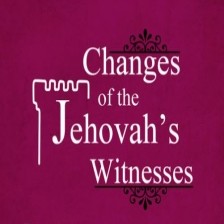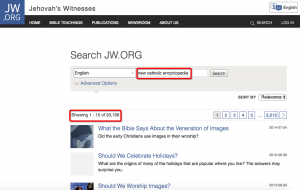Part I
So with you being caught up on my Mormon interactions, let’s switch gears and talk about the Watchtower…..
A good contrast is the Jehovah’s Witnesses will try to win your head, Mormons will try to win your heart.
We have been very slowly slogging our way through the introductory book, “What Does the Bible Really Teach?” Why go slow? Well, it’s a multi-prong approach. The most important thing is to establish an unspoken understanding that there is a significant appreciation for the bible. Witnesses believe those who are in mainstream Christianity do not really read the bible.
The next benefit is to deepen the relationship as people. It’s much harder to dismiss what is being said considering I take the time to get to know them on a personal level.
As we are working our way through the book what the Bible really? I am using as part of my interaction the publication by former missionary, Wilbur Lingle. He has written the booklet, "Response to What Does the Bible Really Teach?" With this book and then the information I know from scripture, I am working through addressing things with my friends. If you are going utilize this booklet (as a bible believing Christian), make sure that you take a look at the updated Watchtower publication as well. There are some subtle differences here and there. The most obvious one is John 17:3. The old versions of the New World Translation had "their taking in knowledge of you." The newest version of the New World Translation says, "their coming to know you."
Those such as Jehovah's Witnesses are known for getting sidetracked on various topics. I can go along with them then make the point I had intended. Although it's slightly unusual, it does work. This is in addition to leading questions is something that Jesus utilized when He was here on earth performing his ministry. By asking a question you can leave them to say something and it is strictly from their mouth. This is much more difficult to dismiss and much less stress for you and for them as well. The goal here is a simply keep them coming back by giving them one or two things to work thinking about along the way.
What it comes to a Bible study with a Jehovah's Witness, the organization has a very different idea from what you may be accustomed to. If you study the Bible there are two major ways thematically/topically and expository. The organization has had its people look at things in a topical manner. The church that I have been associated with, predominately focuses in expository studying. Both do have pros and cons associated with them. The major pro of looking at the Bible in expository fashion is this, Scripture gets look that in context. If you look at things any topical manner, it is possible to “cherry pick” scripture.
Important point when conducting a Bible study with a Jehovah's Witness is this, you read a paragraph at the bottom of every page there is a question that points back to the paragraph and then you have to look into the paragraph to regurgitate the answer. From there what they do is they may add wanted to some points associated based on their personal knowledge. This is how mind control works. The consistent repetition is what will slowly ingratiate a person into the Watchtower "mindset." You are also being treated like a child. If you have kids take a look at their text book for school and see if their textbooks treat them like you are being treated. My suggestion is to NOT read this as there is always the possibility your mind may be twisted as well.
The next major concept is that of biblical exegesis and eisegesis. The former is one drawing out information from the text. The latter is “reading” into the text. Essentially, one is seeing something that is not there.
With that in mind, let’s get started with some key information in the previous weeks:
Introduction-Is This What God Purposed?
The opening question associate with the images is meant to draw a stark contrast. You also see how it has crime, war, terrorism on page three. When you contrast that and open it up with what is present on pages four and five you will see that there are many Biblical statements that talk about the benefits of the Bible teaching. The organization is right that the bible does have benefits from teaching. Next page after that, the organization talks about getting to know the Bible the verse given is II Timothy 3:16. It’s ironic this verse is used. If we use this verse alone, there is zero need to use any extrabiblical publication set forth by the Jehovah's Witnesses. Also, the 66 books of the bible were not set by the Jehovah’s Witnesses but by “evil Christendom.”
One of the quotes given is that “by reading three to five chapters a day, you can read the entire Bible in a year.”
So I asked the study conductor, do you really entire Bible within a year? He said no he does not. His rationale, “you just simply run through it and don’t get as much information as you possibly can. I read it and it took five years.” Interestingly, it can be done in as short as two or three months. Some people read the Bible in the course of one year and there are a number of reading plans that exists if you want to read the Bible chronologically, Old Testament/New Testament selection, etc.
Chapter 1-What Is the Truth About God?
This is a very good one to use as a foundation. Embracing and acting like a child to ask questions will ensure they are the ones who keep conducting the study. Also since they are the "adults," they have the answers which is something that groups similar to the Jehovah's Witnesses are trained to do-answer questions. When your interacting/dialogue with these Jehovah's Witnesses one thing that you do not want to do is ask a close ended question. Close ended question are ones that require a simple "yes" or "no" answer. Shoot for an open ended question that requires thought. This also permits them to maintain the "adult" role.
On to page 12:
Genesis 1:26 is mentioned. If you read that verse that says "let us." What you were doing is you're not setting something up for a Trinity discussion that comes later. Watchtower theology Jesus do is also known as Michael the Archangel. He is responsible for creating therefore we must have the image of God AND and angel's image. Page 13 focuses specifically on the word "Jehovah."
It utilizes the Psalm 83:18 as the supporting scripture. Jehovah as you may or may not know it is actually not the proper name of God it is a common rendering that has just gain acceptance. The one who was responsible for this is a priests name remind this Martini. The first use was in the year 1278. Proof? If your a Witness, take a look at this video and break out the 1971 publication, Aid To Bible Understanding.
The actual term should be YHWH. Regardless your Bible translation depending upon what it maybe may contain Jehovah or not. With that person mind I like to take them into these for other names:
Psalm chapter 68:4 Jah is a term used
Isaiah 57:15 holy is the name use
Isaiah 63:16 redeemer is the name used
One question, how often do you refer to God with those names as well?
On page 15 Psalm 90:2 is a verse that you may wish to mark. Is going to come up later again for what you're going to want to deal his pair this with the verse on page 16 paragraph 20, it says, "you cannot see God because he is invisible spirit." Take a look in your New World Translation (JW Library App if need be) and look at Isaiah 6:1. Also take a look at the opening of verses in the Genesis 18. What we have is God the father a.k.a. Jehovah being looked upon.


